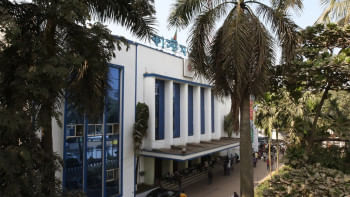Some thoughts on the anti-narcotics drive

Multiple deaths occurr-ing during the ongoing anti-narcotics operations have given rise to sharp reactions. While some quarters feel that the government of the day has seized of the gravity of the drug menace, others take a very critical view by saying that the authorities have indulged in rambling actions without seriously venturing to grasp the root of the malaise and adequately punish the masterminds. Some critics would doubt the very credibility of the reported armed engagement between law enforcers and the drug peddlers and users. The insinuation is that our drug addicts and peddlers are hardly the type who could take firearms to confront the law enforcing agencies.
A dispassionate examination of the process would reveal that while there is no reservation about the propriety of the anti-narcotics operations by the government employing its might and resources, the technique adopted in combating the menace has been highly debatable. In particular, the unusual fatalities thus far numbering more than hundred have raised questions about the real efficacy and correctness of the mode of operations. There is anguish and anger at the alleged failure to lawfully tackle an illegal transaction.
While there is no doubt that the illegal narcotics destroy an entire generation, society's attitude towards such substances has changed substantially over the past six decades. The clear distinction which society once held between drugs which are harmful and illegal and alcohol and tobacco no longer exists. The authority does not proscribe alcohol or tobacco because government income would fall dramatically without alcohol and tobacco taxes. This leads to questions about the value and consistency of laws which attach serious penalties to the use of banned drugs whose dangers are thought to be no greater than those attached to tobacco and alcohol.
It is interesting to note that while there remains little controversy over the addictive and life-threatening dangers of such drugs as cocaine and the opium derivatives, the perception of the dangers of tobacco and alcohol has grown. Health education campaigns have focused on the risks attendant on the issue of tobacco.
In so far as our situation is concerned, the suppliers of drugs need to be prosecuted recognising the fact that individuals cannot use drugs which they have not previously obtained from a supplier. The most feasible way for drug suppliers to be traced is if they are named by their customers, which is where drug prosecutions usually start and drug possession is most easily detected by police among those who are careless and less surreptitious than others in their approach to obtaining drugs. The easiest way to tackle a drug supply chain is to start at the bottom and work up, which means arresting drug users and process them through the justice system.
The link between drug use and other crimes is that illegal drugs are expensive, and users without significant legitimate incomes will commit crime to obtain the money to buy the drugs. While a significant proportion of crime, particularly juvenile crime, is committed by people with a drug habit they cannot afford, this crime issue cannot be dealt with effectively unless the question why such a large number of young people feel the need for drugs in the first place is addressed. This, however, is a major social question, not one that police should be expected to deal with.
There are two entirely different aspects to the question of illegal drug use in our times. One aspect is relatively harmless to society, that a fairly high proportion of people who do not consider themselves criminals indulge in the recreational use of unlawful substances, acknowledging that they are putting themselves at some health risks but arguing that these risks are comparable to or lower than the risks from indulgence in tobacco or over-indulgence in alcohol. Such individuals see their law-breaking as a technical rather than criminal matter, reliant on arbitrary legal definition.
The second aspect of the drugs issue is that of a rather different group within society which also indulges in the use of unlawful and expensive substances, both the recreational drugs used by the first group and other, more harmful and addictive drugs. The difference is that these groups of people are unable to afford its habits and turns to crime to fund them. The first group comes to the notice of police only rarely and then usually by accident, but the second group has become a major and highly visible crime problem.
The debate about drugs and crime has become highly politicised, and police are asked to deal with the problem at its source, the suppliers and importers. While this is undeniably important, supply only answers demand and there would be no complex supply network if there were not a large and profitable pool of drug users as customers. The illegal drugs trade is so large and profitable that even the most draconian police measures are unlikely to succeed. Such measures might bring with them many of the problems that the American society and its police faced during the 1920's and 1930's in maintaining the prohibition of alcohol.
The drug problem could be reduced by reducing the demand for drugs, but this is rarely addressed, since it means discovering what is lacking in so many people's lives that drugs are needed to feel the gap and why so many young people in almost every country of the developed and developing world are so disenchanted and alienated that they feel the need, than addressing these social issues.
If society continues to deal exclusively by way of lethal punishment or incarceration with those individuals whose level of drug use is such that they resort to crime, rather than addressing the reasons for their addictive behaviour, then the drug problem on the streets is likely to become, if it is not already, beyond the ability of police to control. It is, clearly, intolerable that much of the crime in society results from the need of some of its members to support a drug habit. It is far more likely to be a productive crime prevention strategy to determine and address the reasons why individuals feel the need for drugs and to rectify this need rather than merely to punish their offending behaviour. Addiction to anything is difficult to cure, as the number of addicts repeatedly undergoing rehab shows, and is better prevented. Inquiring into the social causes of drug addiction and addressing those causes is, perhaps, the only way to address the drug related crime problem which police and the criminal justice system are currently powerless to deal with effectively.
Muhammad Nurul Huda is a former IGP and a columnist at The Daily Star.





Comments